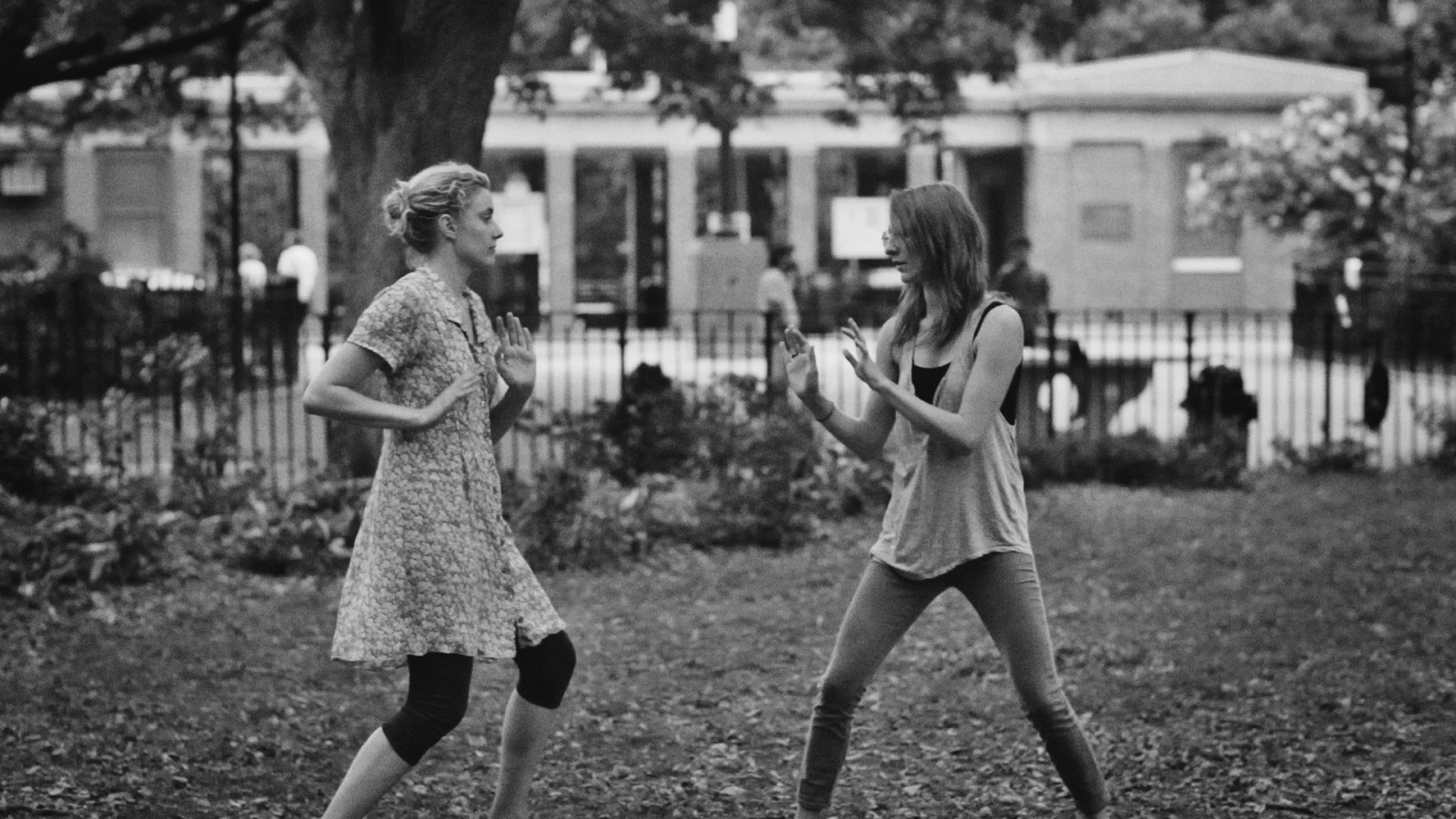PFrances Ha
Opens Fri., May 24 at Meridian and Lincoln Square. Rated R. 86 minutes.
From her earliest mumblecore movies, something about Greta Gerwig didn’t quite fit the scene. Here were these lo-fi indie efforts (including LOL, Hannah Takes the Stairs, and Baghead), nobly scruffy around the edges, intended as the antitheses of Hollywood—and right in the middle of them was a movie star.
Hard to miss it: Gerwig may have been an unknown, but she had crack timing and silent-movie eyes. Despite the best efforts of all concerned, she jumped off the screen at you. Non-mumbly filmmaker Noah Baumbach took note and cast Gerwig in his caustic Greenberg, a move that led to a personal and professional partnership between the two.
The fruit of this is Baumbach’s Frances Ha, co-written by and starring Gerwig, an unabashed tribute to the actress’ distinctive (don’t you dare say “quirky”) charms. The outline of a typical indie picture is in place, as we follow 27-year-old Frances and her New York apartment-hopping over the course of a few months. Frances dreams of being a dancer, as though nobody’d told her that if you haven’t made it as a dancer by 27, your dream should probably be in the past tense. (Actually, somebody probably told her. But her go-with-the-flow optimism is undaunted by such realities.)
In the early reels, we mark Frances’ closeness to her BFF Sophie (Mickey Sumner), a bond that will fray as Sophie gravitates toward her boyfriend. Frances is dubbed “undateable” by a couple of temporary male housemates, although both seem interested in dating her.
The appeal of Frances Ha comes from Gerwig’s pluck and the film’s sprightly sense of play. Many scenes last only a few seconds, and consist of the kind of overheard conversational snippets that capture the found poetry of random eavesdropping. These bits provide a sense of Frances’ life, and perhaps hint at its disconnectedness. Shot in cheap-looking black-and-white, the film also conjures up Baumbach’s love of the French New Wave, and his soundtrack is peppered with vintage ’60s music by Georges Delerue.
As a shortcut to mood-making, the music works its magic, although it’s still a shortcut. More questionable is Baumbach’s recreation of a sequence from Leos Carax’s 1986 Mauvais Sang (Bad Blood ), in which its hero runs down a sidewalk as David Bowie’s “Modern Love” blares. That movie is obscure, and Baumbach couldn’t expect the average viewer to recognize the tribute, so why bother? Why not use a different song, at least?
Even as it veers into the precious, Frances Ha succeeds on its genuinely inventive rat-a-tat rhythm and Gerwig’s unpredictable delivery. It builds to an ending that is righteously non-Hollywood. But it feels good just the same. Robert Horton
Love Is All You Need
Opens Fri., May 24 at Seven Gables & Meridian. Rated R. 110 minutes.
Philip and Ida, who meet cute at their grown children’s wedding in Italy, may not be your ideal couple, but they’re probably the future model of moviegoing couples that Hollywood should woo. Both are well past 40. For their generation, date night means more than Chinese delivery and Netflix. There are proprieties to be observed, important social rituals, basic courtesies. If cancer-survivor Ida’s husband is cheating on her with a much younger woman, she should kick him out. If workaholic produce magnate Philip (Pierce Brosnan) should yell at the Danish Ida (Trine Dyrholm) for hitting his car in the Copenhagen airport garage, he should apologize profusely when he realizes his son and her daughter are to wed. And though a grouch, the widowed Philip does apologize. Good manners still count for something.
After that, with kids and kin gathered for a wedding weekend at Philip’s Sorrento estate, Susanne Bier’s romantic comedy runs strictly according to plan. Hairdresser Ida begins to reveal the effects of her chemotherapy, goes swimming in the nude, and Philip politely averts his eyes. Both tolerate their boorish relations; both respond appropriately when their kids (Molly Blixt Egelind and Sebastian Jessen) begin to hesitate before the altar. If one match falters, another can be lit. (Amid this nuptial confusion of three languages, with Danish and Italian being thrown at him, Brosnan invariably answers in English—like he’s got a Google-translate chip in his brain.)
Bier (Open Hearts, In a Better World ) is unapologetic about constructing this wishful midlife rom-com. And if her story is entirely predictable, it’s also filled with agreeable characters and genuine emotions. The lemon groves and scenery also give it a travelogue aspect; Bier even films the rehearsal dinner by candlelight, recalling The Celebration, whose Paprika Steen here plays Philip’s amusingly tart, predatory sister-in-law Benedikte. Her reticent opposite is Ida, given a kind of beatific, expectant glow by Dyrholm. If Philip’s the frustrated botanist, Ida is the tulip bulb who just needs some careful tending to bloom. BRIAN MILLER
E
film@seattleweekly.com




